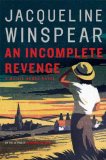Summary | Excerpt | Reading Guide | Reviews | Beyond the Book | Readalikes | Genres & Themes | Author Bio

A Maisie Dobbs Novel
by Jacqueline WinspearPROLOGUE
Early September 1931
The old woman rested on the steps of her home, a caravan set apart from those of the rest of her family, her tribe. She pulled a clay pipe from her pocket, inspected the dregs of tobacco in the small barrel, shrugged, and struck a match against the rim of a water butt tied to the side of her traveling home. She lit the pipe with ease, clamping her ridged lips around the end of the long stem to draw vigor from the almost-spent contents. A lurcher lay at the foot of the steps, seeming at first to be asleep, though the old woman knew that one ear was cocked to the wind, one eye open and watching her every move.
Aunt Beulah Webb—that was the name she was known by, for an older gypsy woman was always known as aunt to those younger—sucked on her pipe and squinted as she surveyed the nearby fields, then cast her eyes to the hop-gardens beyond. The hops would be hanging heavy on the bine by now, rows upon rows of dark-green, spice-aroma’d swags, waiting to be harvested, picked by the nimble hands of men, women and children alike, most of whom came from London for a working late-summer holiday. Others were gypsies like herself, and the rest were gorja from the surrounding villages. Gorja. More house dwellers, more who were not gypsies.
Her people kept themselves to themselves, went about their business without inviting trouble. Aunt Beulah hoped the diddakoi families kept away from the farm this year. A Roma would trust anyone before a diddakoi—before the half-bred people who were born of gypsy and gorja. As far as she was concerned, they looked for trouble, expected it. They were forgetting the old ways, and there were those among them who left the dregs of their life behind them when they moved on, their caravans towed by boneshaker lorries, not horses. The woman looked across at the caravan of the one she herself simply called Webb. Her son. Of course, her son’s baby daughter, Boosul, was a diddakoi, by rights, though with her shock of ebony hair and pebble-black eyes, she favored Roma through and through.
About her business in the morning, Beulah brought four tin bowls from underneath the caravan—underneath the vardo in the gypsy tongue. One bowl was used to wash tools used in the business of eating, one for the laundering of clothes, one for water that touched her body, and another for the cleaning of her vardo. It was only when she had completed those tasks, fetching dead wood from the forest for the fire to heat the water, that she finally placed an enamel kettle among the glowing embers and waited for it to boil for tea. Uneasy unless working, Beulah bound bunches of Michaelmas daisies to sell door to door, then set them in a basket and climbed back into her vardo.
She knew the village gorja, those out about their errands, would turn their backs when they saw her on the street, would glance away from her black eyes and dark skin now rippled with age. They would look aside so as not to stare at her gold hoop earrings, the scarf around her head, and the wide gathered skirt of threadbare deep-purple wool that marked her as a gypsy. Sometimes children would taunt.
“Where are you going, pikey? Can’t you hear, you old gyppo woman?’
But she would only have to stare, perhaps point a charcoal blackened finger, and utter words in dialect that came from deep in the throat, a low grumble of language that could strike fear into the bravest bully—and they would be gone.
Women were the first to turn away, though there were always a few—enough to make it worth her while—who would come to the door at her knock, press a penny into her outstretched hand, and take a bunch of the daisies with speed lest their fingers touch her skin. Beulah smiled. She would see them again soon enough. When dusk fell, a twig would snap underfoot as a visitor approached her vardo with care. The lurcher would look up, a bottomless growl rumbling in her gullet. Beulah would reach down and place her hand on the dog’s head, whispering, “Shhhh, jook.” She would wait until the steps were closer, until she could hold the lurcher no longer, and then would call out, “Who’s there?” And, after a second or two, a voice, perhaps timid, would reply, “I’ve come for my fortune.”
Excerpted from An Incomplete Revenge by Jacqueline Winspear Copyright © 2008 by Jacqueline Winspear. Excerpted by permission of Henry Holt And Company. All rights reserved. No part of this excerpt may be reproduced or reprinted without permission in writing from the publisher.
Education is the period during which you are being instructed by somebody you do not know, about something you do ...
Click Here to find out who said this, as well as discovering other famous literary quotes!
Your guide toexceptional books
BookBrowse seeks out and recommends the best in contemporary fiction and nonfiction—books that not only engage and entertain but also deepen our understanding of ourselves and the world around us.